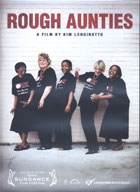
Rough Aunties 2008
Distributed by Women Make Movies, 462 Broadway, New York, NY 10013; 212-925-0606
Produced by Kim Longinotto
Directed by Kim Longinotto
DVD, color, 103 min.
College - Adult
African Studies, Domestic Violence, Gender Studies, Women's Studies, Human Rights, Postcolonialism, Sociology, Social Work, Women's Studies
Date Entered: 02/25/2010
Reviewed by Ciara Healy, Outreach Services Librarian, Polk Library, University of Wisconsin-OshkoshIn Durban, South Africa, there exists an organization called Bobbi Bear that advocates for children who have been sexually and otherwise abused. In the film Rough Aunties the work (successes and failures) of Bobbi Bear is detailed. The women that form Bobbi Bear’s staff work with police, going on raids to arrest accused rapists; going to hospitals with young children for rape examinations; and providing support for one another, sometimes in surprising ways.
Over the course of what seems like only a few weeks, the staff investigates several sexual abuse claims, tracks down court dockets, takes in abandoned children, cleans up a blood soaked room after a fatal robbery attempt, and mourns with a fellow staffer when her son drowns. One of the most striking aspects of the documentary is how much death, violence and degradation the women of Bobbi Bear have to deal with on a weekly basis. What is revealing is that the women of Bobbi Bear are more than capable of handling it, but the systems they work with (or rather without)—governmental, social, cultural, racial—are shown to be as big a problem as the particular crimes committed. Bobbi Bear works with police officers, social services, and a child psychologist but beyond that, there doesn’t seem to be any systems or agencies that deal with the prevention or aftermath of child abuse.
This is no slick Special Victims Unit episode; these are women armed primarily with stuffed bears, magic markers and sharp tongues. The no-nonsense view Bobbi Bear staffers take with perpetrators (and their excuses) account for the title of the film—“auntie” being a Zulu cultural honorific for an older woman not necessarily related to a child and “rough” coming from the emotional hardening that occurs as the staff come into contact with more and more violence against children. You get the sense, from the minimal police and legal presence in the film, that Bobbi Bear is the closest thing Durban, South Africa has to justice.
A significant aspect of this film that has to be mentioned is the interracial make up of the Bobbi Bear staff. Both black and white children are helped during the course of the documentary, but the vast majority of victims are young black girls. There are times where the culture clash is evident and others where it is quite subtle, but the staff’s racial politics seem second to their combined efforts to help children. The founder of Bobbi Bear, Jackie, is white and her commitment to her multi-racial staff is completely thorough. She invokes the moral authority and political work of black women when speaking with them. She thanks them for working to change their country and attempts to activate that political clout to advance the cause of justice. Jackie herself has an adopted black daughter and by the end of the film is working to adopt another. The racial divide in Durban is most evident when she uses it as a rallying cry, but as a white person with an interracial family, she seems to live the social change she is looking to create.
Heartwarming and appalling in turns, Rough Aunties shows what a group of committed women can do when they don’t let anything stand in their way. This film would be a great addition to any library collection that supports globalization, grassroots organizing, and community development.